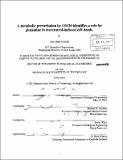| dc.contributor.advisor | Michael R. Freeman and Forest White. | en_US |
| dc.contributor.author | Nichols, Amy Marie | en_US |
| dc.contributor.other | Massachusetts Institute of Technology. Dept. of Biological Engineering. | en_US |
| dc.date.accessioned | 2011-11-18T21:01:00Z | |
| dc.date.available | 2011-11-18T21:01:00Z | |
| dc.date.copyright | 2011 | en_US |
| dc.date.issued | 2011 | en_US |
| dc.identifier.uri | http://hdl.handle.net/1721.1/67207 | |
| dc.description | Thesis (Ph. D.)--Massachusetts Institute of Technology, Dept. of Biological Engineering, 2011. | en_US |
| dc.description | Cataloged from PDF version of thesis. | en_US |
| dc.description | Includes bibliographical references. | en_US |
| dc.description.abstract | Recent evidence demonstrates a correlative relationship between metabolic disorders and cancer prevalence. In addition, cholesterol lowering statins and the antidiabetes medication metformin both act as chemopreventive agents in prostate and other cancers. The natural compound resveratrol has similar properties: increasing insulin sensitivity, suppressing adipogenesis, and killing cancer cell lines in vitro. However, in vivo tumor xenografts acquire resistance to resveratrol by an unknown mechanism, while mouse models of metabolic disorders still respond to the compound. Given the metabolic implications of these data and the role of metabolism in prostate cancer incidence, we evaluated resveratrol in an in vitro disease progression model of prostate cancer and found that castration-resistant human prostate cancer C4-2 cells are more sensitive to resveratrol-induced apoptosis than isogenic androgen-dependent LNCaP cells. Inhibiting downstream pro-survival signaling with the MEK inhibitor U0126 rescued the C4-2 cells from resveratrol-induced death, however other MEK inhibitors did not recapitulate this response. In fact, U0126 acted independently of MEK, inhibiting mitochondrial function and shifting cells to aerobic glycolysis. Mitochondrial activity of U0126 arose through decomposition, producing both mitochondrial fluorescence and cyanide, a known inhibitor of complex IV. Applying U0126 mitochondrial inhibition to C4-2 cell apoptosis, we investigated the role of mitochondrial metabolism and focused on how glutamine supplementation of citric acid cycle intermediate a-ketoglutarate may be involved. Suppression of the conversion of glutamate to a-ketoglutarate with the transaminase inhibitors cycloserine and amino oxyacetate rescued C4-2 cells from resveratrol-induced death. In addition, reducing extracellular glutamine concentration in the culture medium also inhibited apoptosis. These results imply resveratrolinduced death is dependent on glutamine metabolism, a pathway dysregulated in a variety of cancers linked to oncogenic signaling. Further work on resveratrol and metabolism in cancer is warranted to ascertain if the glutamine dependence has clinical implications. | en_US |
| dc.description.statementofresponsibility | by Amy Marie Nichols. | en_US |
| dc.format.extent | 106 p. | en_US |
| dc.language.iso | eng | en_US |
| dc.publisher | Massachusetts Institute of Technology | en_US |
| dc.rights | MIT theses are protected by copyright. They may be viewed, downloaded, or printed from this source but further reproduction or distribution in any format is prohibited without written permission. | en_US |
| dc.rights.uri | http://dspace.mit.edu/handle/1721.1/7582 | en_US |
| dc.subject | Biological Engineering. | en_US |
| dc.title | A metabolic perturbation by U0126 identifies a role for glutamine in resveratrol-induced cell death | en_US |
| dc.type | Thesis | en_US |
| dc.description.degree | Ph.D. | en_US |
| dc.contributor.department | Massachusetts Institute of Technology. Department of Biological Engineering | |
| dc.identifier.oclc | 758883277 | en_US |
